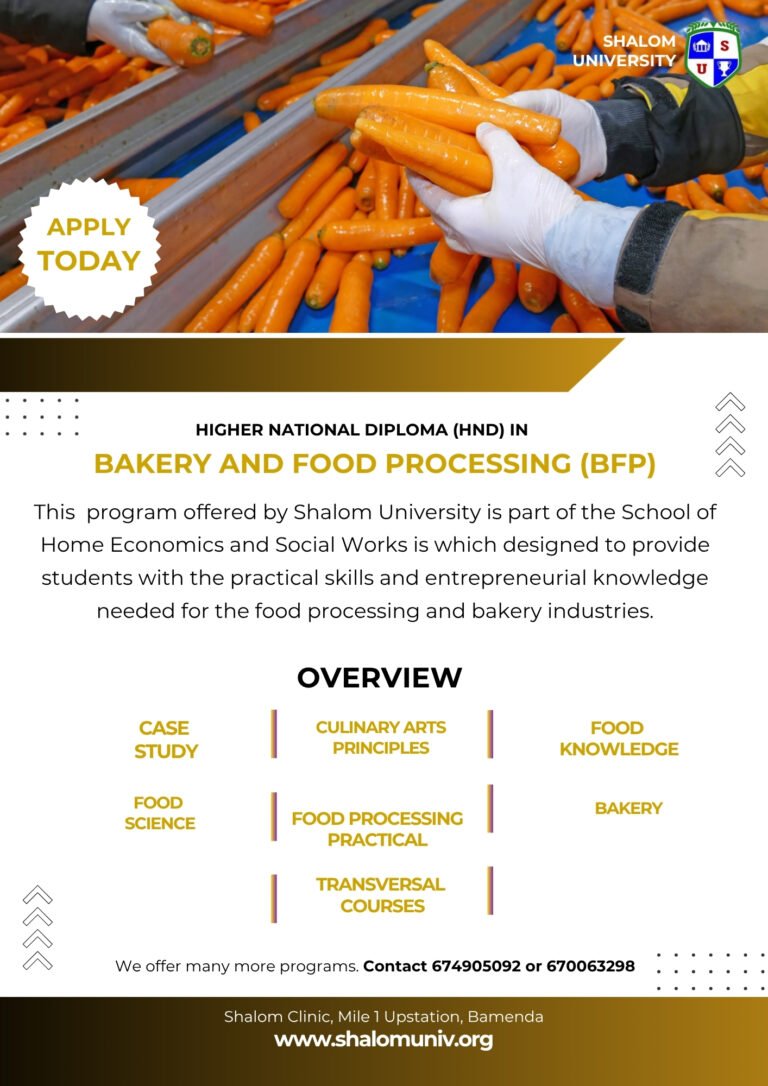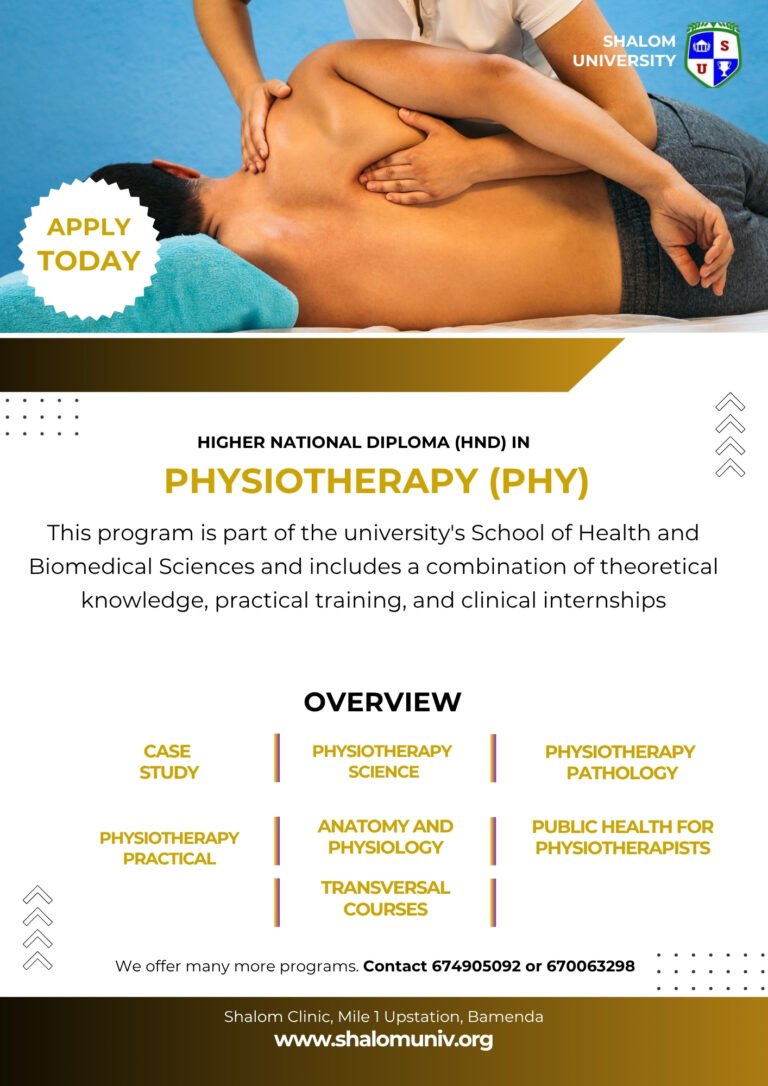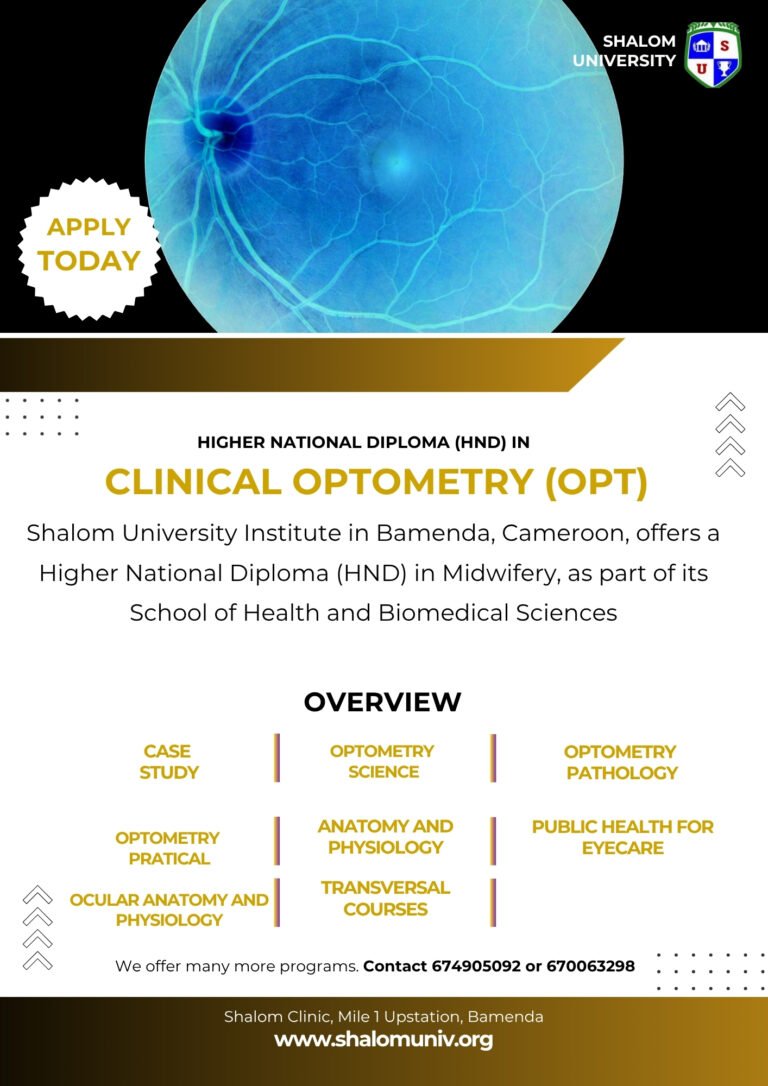In Cameroon, the field of Medical Laboratory Sciences (MLS) is a cornerstone of the healthcare system, providing the vital diagnostic information needed by doctors and clinicians to effectively treat patients. Accurate and reliable laboratory results are fundamental to disease prevention, outbreak control, and public health surveillance, especially given Cameroon’s diverse epidemiological landscape and public health challenges. For those aspiring to become the skilled professionals who work behind the scenes in laboratories, Shalom University in Bamenda offers an accredited HND in Medical Laboratory Sciences that is specifically tailored to the Cameroonian context.
The curriculum at Shalom University is designed to be both comprehensive and practical, blending rigorous theoretical knowledge with extensive hands-on training. The program is developed to produce graduates who are not just technicians but critical thinkers capable of managing complex laboratory processes and contributing to the advancement of healthcare. The core courses emphasize the breadth of the medical laboratory discipline, ensuring graduates are well-rounded and competent across all major laboratory sections.
The MLS Blueprint at Shalom University
The HND in Medical Laboratory Sciences at Shalom University is structured around core papers that cover the most critical areas of clinical diagnostics. Each paper is vital for building a complete understanding of how laboratory science supports patient care, from initial diagnosis to treatment monitoring.
Paper: Medical Microbiology and Parasitology
In a country like Cameroon, where infectious diseases such as malaria, typhoid, and a range of bacterial and parasitic infections are prevalent, a deep understanding of microbiology and parasitology is indispensable. This core paper at Shalom University equips students with the skills to identify and analyze the microorganisms and parasites that cause disease.
The course content includes:
- Bacteriology: Students learn to isolate, culture, and identify bacteria from clinical specimens. This is crucial for guiding antibiotic selection and combating resistance, a growing concern in global health.
- Virology: With the emergence of global health threats and new viruses, training in virology is more important than ever. Students learn the techniques for viral detection and serological diagnosis.
- Mycology: The study of fungi and fungal infections, which are also a significant health challenge in tropical climates.
- Parasitology: This module focuses on the identification of parasites, such as those that cause malaria and other tropical parasitic diseases common in Cameroon. Students learn to perform microscopic analysis of blood films and stool samples.
Through practical lab sessions, students gain firsthand experience with staining techniques, microscopy, and culture methods, preparing them for the realities of working in a Cameroonian clinical lab.
Paper: Haematology and Blood Transfusion Science
Haematology, the study of blood, and blood transfusion science are essential for diagnosing blood-related disorders, managing anemia (a widespread issue in Cameroon), and ensuring a safe blood supply. Shalom University’s program ensures students are experts in this critical area.
The curriculum covers:
- Clinical Haematology: Students master techniques for analyzing blood samples, performing blood cell counts, and identifying abnormalities in cell morphology that point to conditions like anemia, leukemia, or infection.
- Immunohaematology and Blood Transfusion: This section is vital for patient safety. Students learn about blood group typing, cross-matching, and the protocols for safe and effective blood transfusions. Given the persistent need for blood donations in Cameroon, this expertise is invaluable.
- Coagulation Studies: Understanding blood clotting mechanisms is necessary for managing patients with bleeding disorders or those on anticoagulant therapy.
This paper provides the technical proficiency required to work in hospital-based blood banks and clinical haematology labs.
Paper: Clinical Biochemistry and Molecular Biology
This paper delves into the chemical processes and molecular mechanisms within the human body. Clinical biochemistry provides diagnostic information on organ function, metabolic disorders, and hormone levels, while molecular biology introduces students to cutting-edge diagnostic technologies.
Key topics include:
- Clinical Biochemistry: Students learn to perform a wide array of chemical analyses on biological fluids, including tests for liver function, kidney function, blood sugar levels, and electrolyte balance. This is fundamental for managing chronic diseases like diabetes and hypertension, which are increasingly common in Cameroon.
- Molecular Biology: The inclusion of molecular biology reflects the evolution of modern laboratory medicine. Students are introduced to techniques like PCR (Polymerase Chain Reaction) for genetic testing and infectious disease diagnosis. This is particularly relevant for the surveillance of pathogens and early detection of genetic disorders.
- Immunology and Serology: This section covers the study of the immune system and the detection of antibodies and antigens in patient samples. This is crucial for diagnosing autoimmune disorders and infectious diseases like HIV and Hepatitis.
The integration of these subjects ensures that Shalom University graduates are prepared for both routine clinical work and emerging diagnostic technologies.
Paper: Histopathology-Human Cytology
This paper is dedicated to the microscopic examination of human tissues and cells to detect and diagnose disease, particularly cancer. It is a highly specialized area of laboratory science that plays a crucial role in oncology and pathology.
Students in this module learn:
- Tissue Processing: The intricate process of preparing tissue samples for microscopic examination, including fixation, embedding, and sectioning.
- Staining Techniques: Mastery of various staining methods to highlight specific cellular components and abnormalities.
- Microscopic Diagnosis: Students develop the skills to examine prepared tissue slides under a microscope, identifying cellular changes indicative of disease. This is a critical skill for cancer diagnosis and monitoring.
- Human Cytology: Focused on the study of individual cells, this section covers techniques like preparing Pap smears to screen for cervical cancer, a significant health concern in Cameroon.
The training in histopathology and cytology is highly practical, often conducted in collaboration with pathology labs to provide students with real-world exposure to diagnostic processes.
Paper: Case Study
The Case Study paper is the capstone of the HND program, integrating all the theoretical and practical knowledge acquired. It is a vital component that moves students from passive learning to active, critical engagement with patient diagnostics.
In this module, students:
- Analyze Comprehensive Patient Cases: Students are given detailed patient information, including clinical history, symptoms, and initial lab requests. They must then propose a comprehensive laboratory investigation plan.
- Interpret and Correlate Results: After simulating the lab work, students analyze the results across all the major lab sections (haematology, microbiology, biochemistry, etc.) and correlate them with the patient’s clinical picture.
- Formulate a Lab Diagnosis: The ultimate goal is to propose a cohesive laboratory diagnosis that supports or refutes the clinician’s initial hypothesis.
- Present and Defend Findings: The case study culminates in a presentation where students defend their investigative approach, interpretation of results, and final diagnosis. This strengthens their communication and analytical skills, which are crucial for collaborating effectively with other healthcare professionals in Cameroon.
This paper ensures that Shalom University graduates are not only technically proficient but also skilled critical thinkers, ready to take on the diagnostic challenges of the modern healthcare system.
A Career in Scientific Service
The HND in Medical Laboratory Sciences from Shalom University is more than a diploma; it is a passport to a career in scientific service, directly impacting public health in Cameroon. Graduates are equipped with the skills and confidence to work in diverse settings, including public and private hospitals, research institutions, and disease surveillance programs. They emerge as competent professionals ready to face the unique health challenges of the Cameroonian environment and contribute meaningfully to the well-being of its population. The program’s commitment to combining specialized knowledge with practical, integrated case analysis ensures that its graduates are well-prepared for a rewarding and vital role at the heart of healthcare.




